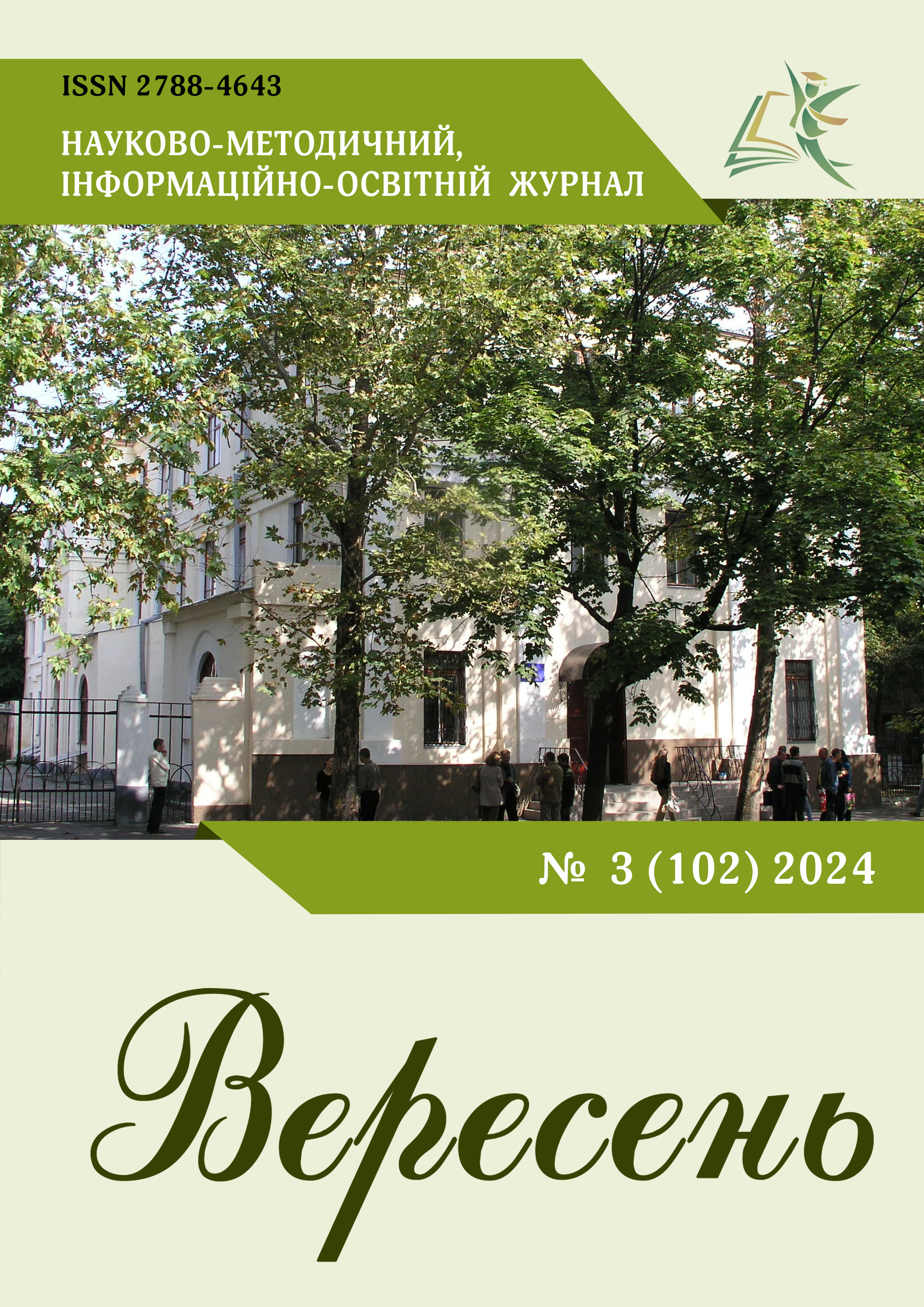ОСОБЛИВОСТІ СТВОРЕННЯ ТА ФУНКЦІОНУВАННЯ РЕПОЗИТАРІЮ АКАДЕМІЧНИХ ТЕКСТІВ У ЗАКЛАДІ ПІСЛЯДИПЛОМНОЇ ПЕДАГОГІЧНОЇ ОСВІТИ
DOI:
https://doi.org/10.54662/veresen.3.2024.10Ключові слова:
академічна доброчесність, академічні тексти, відкритий доступ, науковий простір, освітній ресурс, програмне забезпечення, репозитарій, цифровий архівАнотація
У статті розглянуто питання розвитку, трансформації та впливу репозитаріїв академічних текстів на поступ науки, проаналізовано публікації відомих зарубіжних та українських науковців, що стосуються цифрових архівів та їхньої типологізації. Досліджено можливості використання репозитаріїв в освітньому процесі. Розглянуто структуру та функціонал сучасного інституційного репозитарію, його компоненти та роль у збереженні і поширенні наукових знань. Описано технічні аспекти, використання хмарних рішень та програмного забезпечення для управління репозитарієм. Здійснено огляд функціоналу та структури репозитарію академічних текстів Миколаївського обласного інституту післядипломної педагогічної освіти з описом процесу розроблення та впровадження.
Посилання
Chmyr, O. S. (2022). Natsionalnyi repozytarii akademichnykh tekstiv u systemi vidkrytoi nauky: suchasnyi stan ta maibutnii rozvytok [National repository of academic texts in the open science system: current state and future development]. In Persha mizhnarodna konferentsiia «Vidkryta nauka ta innovatsii v Ukraini 2022», 1–6. Kyiv: UkrINTEI. Retrieved from DOI: http://doi.org/10.35668/978-966-479-129-5-1-6 (ukr).
Harnad, S. (2001). The self-archiving initiative: Freeing the refereed research literature online. Nature, 410 (6832), 1024–1025. DOI: https://doi.org/10.1038/35074210 (eng).
Lynch, C. (2003). Institutional Repositories: Essential Infrastructure for Scholarship in the Digital Age. portal: Libraries and the Academy, 3(2), 327–336. DOI: https://doi.org/10.1353/pla.2003.0039 (eng).
Oleksiuk, V. P. & Oleksiuk, O. R. (2012). Instytutsiinyi repozytarii: mozhlyvosti zastosuvannia u navchalnomu protsesi [Institutional repository: possibilities of application in the educational process]. Informatsiini tekhnolohii i zasoby navchannia, 6 (32), 1–13 (ukr).
Polozhennia pro instytutsiinyi repozytarii akademichnykh tekstiv MOIPPO [Regulations on the institutional repository of academic texts MOIPPO]. (2018). Retrieved from https://repository.moippo.mk.ua/upload/polojennya.pdf (ukr).
Rehlament roboty instytutsiinoho repozytarii akademichnykh tekstiv MOIPPO [Regulations on the operation of the institutional repository of academic texts MOIPPO]. (2020). Retrieved from https://repository.moippo.mk.ua/upload/reglament.pdf (ukr).
Statystyka OpenDOAR [OpenDOAR Statistics]. (n.d.). Retrieved from https://v2.sherpa.ac.uk/view/repository_visualisations/1.html (ukr).
Yaroshenko, T. O. (2021). Vidkrytyi dostup, vidkryta nauka, vidkryti dani: yak tse bulo i kudy ydemo [Open access, open science, open data: how it was and where we are going] (To the 20th anniversary of the Budapest Open Access Initiative). Ukrainskyi zhurnal z bibliotekoznavstva ta informatsiinykh nauk, (8), 10–26. DOI: https://doi.org/10.31866/2616-7654.8.2021.247582 (ukr).
Yatsyshyn, A. V. (2021). Teoretyko-metodychni osnovy vykorystannia tsyfrovykh vidkrytykh system u pidhotovtsi aspirantiv i doktorantiv z nauk pro osvitu [Theoretical and methodological foundations of the use of digital open systems in the training of PhD students and doctoral candidates in education sciences]. (Doctor’s thesis). Institute of Information Technologies and Learning Tools of NAPS of Ukraine. Kyiv (ukr).
Van de Sompel, H., & Lagoze, C. (2000). The Santa Fe Convention of the Open Archives Initiative. D-Lib Magazine, 6(2). DOI: https://doi.org/10.1045/february2000-vandesompel-oai (eng).




